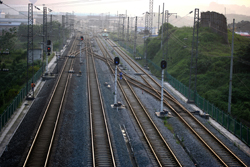Production of a Life Cycle Assessment Tool – LCAT
Europe is encouraging greater rail usage, but that will accelerate the already extensive deterioration of the track system. Some sections really need a complete shutdown and long-term overhaul while at the same time the rail service in Europe demands low-impact maintenance of short duration. In short, these conflicting goals cannot be reconciled without new strategies for maintenance intervention. This is what the (MAINLINE)(opens in new window) is aiming to develop, with EU funding over three years until September 2014. The 19-member consortium's primary goal is to develop methods and tools enabling cheaper and more effective rail infrastructure maintenance. In doing so, it will also focus on minimising risk, improving knowledge about deterioration mechanisms, and comparing various whole-life maintenance options. The project’s main result will be the production of a life-cycle assessment tool taking into account both economic and environmental impacts. One of the main activities of the project is to investigate new technologies to extend the life of infrastructure. Eventually, a guideline for the application of such technologies will be produced. MAINLINE has commenced initial investigations into damage and deterioration scenarios for selected asset types. The project is also reviewing various damage phenomena and how intervention strategies might affect them. Development of monitoring and examination techniques is ongoing. Concerning replacement of obsolete infrastructure, the project focuses on investigating construction methods that minimise time and cost. This yields a variety of options, from which a shortlist has been recommended. A guideline related to replacement will be available at the end of the project. In the middle of the project timeframe, MAINLINE organised a common workshop with another relevant Seventh Framework Programme (FP7) project. The meeting helped to define common fields of work and to develop further collaboration. Two more workshops will be organised: one to transfer knowledge to Central and Eastern Europe and one to communicate about the final results of the project. The results of MAINLINE have also been presented during many public events. During the IABMAS conference in Shanghai in July 2014 a special mini-seminar with 8 MAINLINE presentations will take place. When complete, the MAINLINE project will have produced methods to extend the service life of existing infrastructure. The project will have yielded a better understanding of the methods of degradation and their mitigation, plus improved monitoring and replacement techniques. Results of all investigations will be used as input for the life-cycle assessment tool. Thanks to this tool it will be possible for infrastructure managers to compare different maintenance/replacement strategies for track and structures based on a life cycle evaluation. The research should therefore help to keep Europe's rail system operational and continually improving on a long-term basis.



